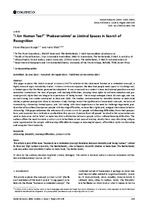| dc.contributor.author | Budge, MacLeod | |
| dc.contributor.author | Wels, Harry | |
| dc.date.accessioned | 2016-11-13T16:00:03Z | |
| dc.date.available | 2016-11-13T16:00:03Z | |
| dc.date.issued | 2016 | |
| dc.identifier.citation | Budge, M. and Wels, H. (2016). “I Am Human Too!” ‘probeerruimte’ as liminal spaces in search of recognition. Social Inclusion, 4(4): 140-149 | en_US |
| dc.identifier.issn | 2183–2803 | |
| dc.identifier.uri | http://hdl.handle.net/10566/2467 | |
| dc.identifier.uri | http://dx.doi.org/10.17645/si.v4i4.701 | |
| dc.description.abstract | This paper explores the Dutch concept ‘probeerruimte’ in relation to the statement ‘human as a contested concept’, a
highly relevant topic in disability studies. Probeerruimte encompasses the idea that people need space to ‘try things out’,
a liminal space that facilitates personal development. It was conceived in a context where institutional practices exerted
restrictive control over the lives of people with learning difficulties, denying them rights to self-determination and personal
growth, rights that are integral to experiences of ‘being human’. The concept emerged about 20 years ago, and was
revived during two studies conducted in 2014 and 2015. The studies, commissioned by Disability Studies in Nederland
(DSiN), explored perceptions of social inclusion. Study findings reveal the significance of associated concepts, inclusive of
connectivity, citizenship, liminal spaces, and ‘risk taking’. Of critical importance is the need to challenge hegemonic practices
that all too often disempower people with learning difficulties, remove their rights and, relegate their status to below
citizenship. This paper addresses the relevance of probeerruimte for people with learning difficulties, from their perspectives,
and examines how institutions can facilitate this process. Opinions from ‘all people’ involved in the conversation are
used as data so as not to ‘label’ or make too strict a distinction between people with or without learning difficulties. The
authors affirm the need to create probeerruimte to facilitate varied ways of existing. Ideally these ways of existing will promote
opportunities for people with learning difficulties to engage in meaningful spaces, affirm their rights to citizenship
and recognise their humanity. | en_US |
| dc.language.iso | en | en_US |
| dc.publisher | Cogitatio | en_US |
| dc.rights | Copyright, The Authors. This article is licensed under a Creative Commons Attribution 4.0 International License (CC BY). | |
| dc.source.uri | http://dx.doi.org/10.17645/si.v4i4.701 | |
| dc.subject | Citizenship | en_US |
| dc.subject | Disability | en_US |
| dc.subject | Learning difficulty | en_US |
| dc.subject | Disability Studies in Nederland (DSiN) | en_US |
| dc.subject | Posthumanism | |
| dc.title | “I Am Human Too!” ‘probeerruimte’ as liminal spaces in search of recognition | en_US |
| dc.type | Article | en_US |

